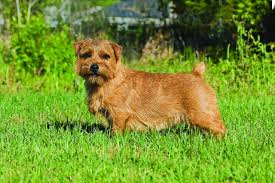
Norfolk Terrier
Conditions of detention
Norfolk Terriers are adaptable and can thrive in both urban and rural environments. They do well in homes with a yard where they can play, but they can also adapt to apartment living if given sufficient exercise.
Useful Fact: Despite their small size, Norfolk Terriers have a lot of energy and need regular exercise to stay happy and healthy.
Nutrition and diet
A balanced diet rich in high-quality protein and essential nutrients is important for Norfolk Terriers. High-quality commercial dog food or a well-planned homemade diet can meet their nutritional needs.
Useful Fact: Portion control is crucial as Norfolk Terriers can be prone to obesity if overfed.
Health
Norfolk Terriers are generally healthy, but they can be prone to certain genetic health issues such as hip dysplasia, patellar luxation, and heart problems. Regular veterinary check-ups are essential.
Useful Fact: Their lifespan is typically between 12 to 15 years with proper care and regular veterinary visits.
Grooming and care
Norfolk Terriers have a wiry, weather-resistant double coat that requires regular grooming. Weekly brushing and occasional hand-stripping are necessary to maintain their coat.
Useful Fact: Regular grooming helps reduce shedding and keeps their coat in good condition.
Education and training
Norfolk Terriers are intelligent and eager to please, making them relatively easy to train. Consistent, positive reinforcement methods work best.
Useful Fact: Early socialization and training are crucial to manage their natural hunting instincts and ensure they are well-behaved companions.
Toys and entertainment
These terriers enjoy toys that challenge their minds and bodies. Interactive toys, fetch games, and toys that simulate hunting are excellent choices.
Useful Fact: Regular mental and physical stimulation through play and training can prevent boredom and destructive behaviors.
Safety
Given their strong prey drive, Norfolk Terriers should be supervised when off-leash. A secure, fenced yard is important to prevent them from chasing after small animals.
Useful Fact: They are skilled diggers, so ensuring fences are secure and checking for escape routes is essential.
Accessories
Essential accessories for Norfolk Terriers include sturdy collars, leashes, and harnesses. Comfortable bedding and appropriately sized crates for travel are also necessary.
Useful Fact: Reflective gear can improve their visibility during early morning or evening walks, enhancing their safety.
Socialization
Early and ongoing socialization with people, other dogs, and various environments is crucial for Norfolk Terriers to develop into well-rounded adults.
Useful Fact: Proper socialization helps them adapt to new situations and reduces potential anxiety or fear-based behaviors.
Travel and Transportation
Norfolk Terriers are adaptable travelers and can handle car rides well if accustomed to them from a young age. Ensure they are securely restrained during travel.
Useful Fact: Portable water bowls and travel crates can make journeys more comfortable for them, especially on long trips.
Behavior and psychology
Norfolk Terriers are known for their intelligence, loyalty, and high energy. They form strong bonds with their owners and require mental and physical stimulation.
Useful Fact: Regular exercise and mental challenges help prevent anxiety and behavioral issues, ensuring a well-balanced temperament.
Legal aspects
Owners should be aware of local leash laws and regulations regarding pet ownership. It’s also important to ensure they are up-to-date with vaccinations and licenses.
Useful Fact: Microchipping can help recover a lost dog more quickly and is often required by local regulations.


